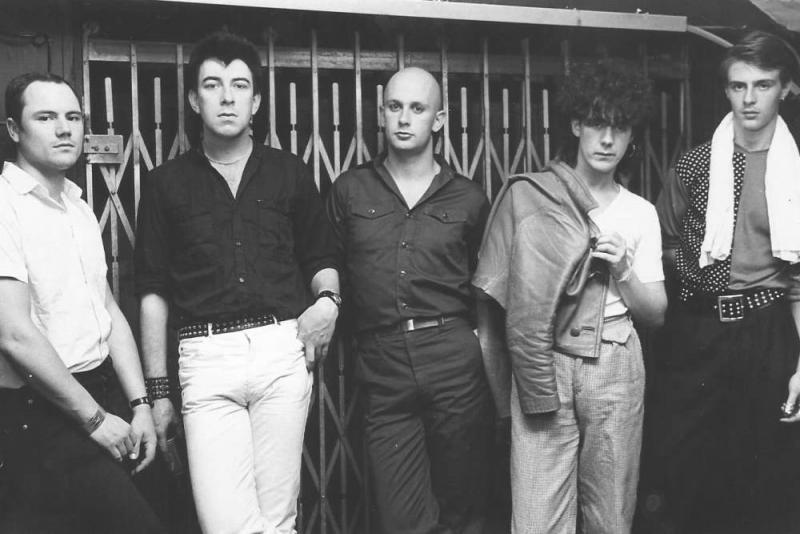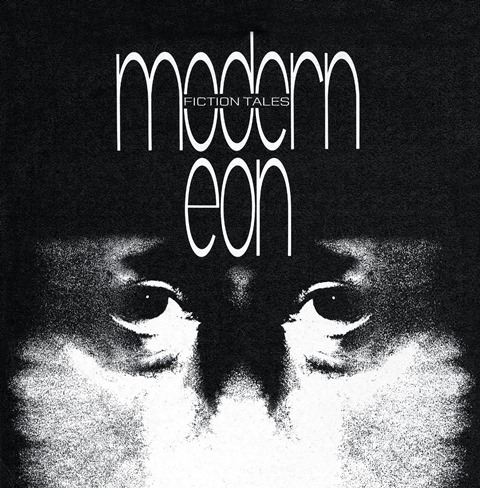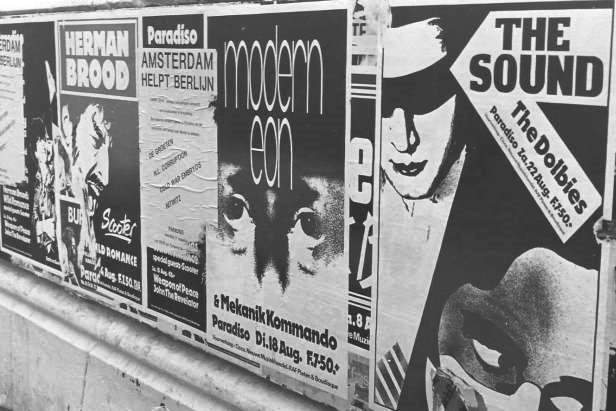Music Reissues Weekly: Modern Eon - Fiction Tales | reviews, news & interviews
Music Reissues Weekly: Modern Eon - Fiction Tales
Music Reissues Weekly: Modern Eon - Fiction Tales
Underappreciated Liverpool post-punk outfit is ripe for reappraisal

The most commercially and consistently successful band on DinDisc was Orchestral Manoeuvres in the Dark. Martha and the Muffins also made a mark. Label mates The Monochrome Set were cool, distinctive but not so chart friendly. The Revillos were less reserved, as was New Wave of British Heavy Metal outfit Dedringer. The patronage of Heaven 17 brought dance troupe Hot Gossip to the label.
DinDisc was an offshoot of Virgin Records with arty leanings. Extant from autumn 1979 to early 1981 it was in keeping with the Charisma subsidiary Pre, which operated over a similar period. Both paved the way for future major-label-funded imprints like the WEA-sponsored Blanco y Negro Records. Indie credibility was always worth striving for.
 Like OMD, Modern Eon were from Liverpool. They signed with DinDisc after a couple of for-real independent seven-inchers, the second of which was on Inevitable, the hothouse label which also issued early singles by Wah! Heat, Dead or Alive, China Crisis and It’s Immaterial. For DinDisc, Modern Eon released three singles and an album, 1981’s Fiction Tales.
Like OMD, Modern Eon were from Liverpool. They signed with DinDisc after a couple of for-real independent seven-inchers, the second of which was on Inevitable, the hothouse label which also issued early singles by Wah! Heat, Dead or Alive, China Crisis and It’s Immaterial. For DinDisc, Modern Eon released three singles and an album, 1981’s Fiction Tales.
Considering the context, it’s curious Fiction Tales hasn’t been legally reissued before. It’s integral to Britain’s post-punk landscape. Now, it’s belatedly reappeared in a 2-CD expanded edition – the album plus tracks from singles and a couple of previously unheard cuts which could have appeared on a second album. Completists should note that their contribution to the Street To Street compilation is absent, as are two of the cuts from their first EP. Their BBC radio sessions are also not included.
The band formed in 1978 as Luglo Slugs and after a brief spell as Tank Time issued a first single on their own Eon label as Modern Eon in 1979. Next, to Inevitable and then DinDisc. At the latter imprint, despite a profile-raising London support slot to The Stranglers, it seems they were lost.
When Fiction Tales came out in June 1981, Smash Hits described them as "brooding,” “thoughtful”, about “atmosphere and emotion” and having a fondness for “wispy melodies” and “moody landscapes” while conceding it “may take a while to come up with a hit single.” Later in the year, the fanzine Bop Eye noted that Fiction Tales “emerged quietly” and that it “failed to make any kind of splash whatsoever…in both sales and publicity.” In that piece, frontman Alex Johnson (then using the name Alix Plain) said “our music comes first and our personality later. We’re not just one of those bands whose name you hear on TV, radio, in the press. I don’t know what happened to our album…I just don’t know why the album didn’t do better. Our new album is going to be even better.” There was no second album, and Modern Eon called it a day in summer 1982.
 Fiction Tales is a glacial gem, loosely similar to the direction taken by contemporary bands Comsat Angels and The Sound. Johnson’s vocal are distant. The spare arrangements are punctuated by flurries of rattling drums like those of Joy Division’s “Atmosphere” and snappy bass along the lines of the Banshees’ Steve Severin. There’s a propulsion to these slices of atmosphere without the grand architecture of fellow Liverpudlians Echo & the Bunnymen or the swagger of Wah! Heat. There is a restraint. (pictured left, Modern Eon play Amsterdam, August 1981)
Fiction Tales is a glacial gem, loosely similar to the direction taken by contemporary bands Comsat Angels and The Sound. Johnson’s vocal are distant. The spare arrangements are punctuated by flurries of rattling drums like those of Joy Division’s “Atmosphere” and snappy bass along the lines of the Banshees’ Steve Severin. There’s a propulsion to these slices of atmosphere without the grand architecture of fellow Liverpudlians Echo & the Bunnymen or the swagger of Wah! Heat. There is a restraint. (pictured left, Modern Eon play Amsterdam, August 1981)
Individually, songs like “Choreography,” “Playwrite” and the vaguely Jon Anderson-ish “Child’s Play” (a resemblance noted in the music press at the time which still stands) sound as if they ought to have easily found an audience. But Modern Eon found themselves confined to the lower reaches of the Top 40 and did not click. The collection's two hitherto unheard post-album tracks suggest they had not moved forward after Fiction Tales.
With DinDisc’s final release hitting shops in February 1982, Modern Eon were in a difficult position – their imprint was no more and unlike Orchestral Manoeuvres in the Dark they were not transferred over to parent label Virgin. Left stranded, they had a limited lifespan. All of which is a pity as what’s here makes the case that they could have broken through. Indeed, they laid the ground for a band which charted for the first time in 1982. Listening to this confirms Modern Eon set the sonic template for the early Tears For Fears.
- Next week: Dave Brubeck Quartet - Debut In The Netherlands 1958. Document of the first European tour
- More reissue reviews on theartsdesk
- Kieron Tyler’s website
Explore topics
Share this article
The future of Arts Journalism
You can stop theartsdesk.com closing!
We urgently need financing to survive. Our fundraising drive has thus far raised £49,000 but we need to reach £100,000 or we will be forced to close. Please contribute here: https://gofund.me/c3f6033d
And if you can forward this information to anyone who might assist, we’d be grateful.

Subscribe to theartsdesk.com
Thank you for continuing to read our work on theartsdesk.com. For unlimited access to every article in its entirety, including our archive of more than 15,000 pieces, we're asking for £5 per month or £40 per year. We feel it's a very good deal, and hope you do too.
To take a subscription now simply click here.
And if you're looking for that extra gift for a friend or family member, why not treat them to a theartsdesk.com gift subscription?
more New music
 Wilderness Festival 2025 review - seriously delirious escapism
A curated collision of highbrow hedonism, surreal silliness and soulful connection
Wilderness Festival 2025 review - seriously delirious escapism
A curated collision of highbrow hedonism, surreal silliness and soulful connection
 Album: Ethel Cain - Willoughby Tucker, I'll Always Love You
Relatively straightforward songs from the Southern Gothic star - with the emphasis on 'relatively'
Album: Ethel Cain - Willoughby Tucker, I'll Always Love You
Relatively straightforward songs from the Southern Gothic star - with the emphasis on 'relatively'
 Album: Black Honey - Soak
South Coast band return with another set of catchy, confident indie-rockin'
Album: Black Honey - Soak
South Coast band return with another set of catchy, confident indie-rockin'
 Album: Molly Tuttle - So Long Little Miss Sunshine
The US bluegrass queen makes a sally into Swift-tinted pop-country stylings
Album: Molly Tuttle - So Long Little Miss Sunshine
The US bluegrass queen makes a sally into Swift-tinted pop-country stylings
 Music Reissues Weekly: Chip Shop Pop - The Sound of Denmark Street 1970-1975
Saint Etienne's Bob Stanley digs into British studio pop from the early Seventies
Music Reissues Weekly: Chip Shop Pop - The Sound of Denmark Street 1970-1975
Saint Etienne's Bob Stanley digs into British studio pop from the early Seventies
 Album: Mansur Brown - Rihla
Jazz-prog scifi mind movies and personal discipline provide a... complex experience
Album: Mansur Brown - Rihla
Jazz-prog scifi mind movies and personal discipline provide a... complex experience
 Album: Reneé Rapp - Bite Me
Second album from a rising US star is a feast of varied, fruity, forthright pop
Album: Reneé Rapp - Bite Me
Second album from a rising US star is a feast of varied, fruity, forthright pop
 Album: Cian Ducrot - Little Dreaming
Second album for the Irish singer aims for mega mainstream, ends up confused
Album: Cian Ducrot - Little Dreaming
Second album for the Irish singer aims for mega mainstream, ends up confused
 Album: Bonniesongs - Strangest Feeling
Intriguing blend of the abstract, folkiness, grunge and shoegazing from Sydney
Album: Bonniesongs - Strangest Feeling
Intriguing blend of the abstract, folkiness, grunge and shoegazing from Sydney
 Album: Debby Friday - The Starrr of the Queen of Life
Second from Canadian electronic artist and singer offers likeable, varied EDM
Album: Debby Friday - The Starrr of the Queen of Life
Second from Canadian electronic artist and singer offers likeable, varied EDM
 Music Reissues Weekly: The Pale Fountains - The Complete Virgin Years
Liverpool-born, auteur-driven Eighties pop which still sounds fresh
Music Reissues Weekly: The Pale Fountains - The Complete Virgin Years
Liverpool-born, auteur-driven Eighties pop which still sounds fresh
 Album: Indigo de Souza - Precipice
US singer's fourth ups the pop ante but doesn't sacrifice lyrical substance
Album: Indigo de Souza - Precipice
US singer's fourth ups the pop ante but doesn't sacrifice lyrical substance

Add comment